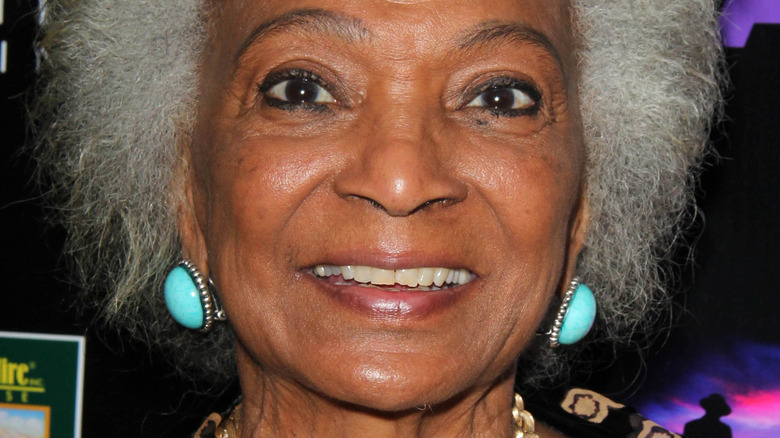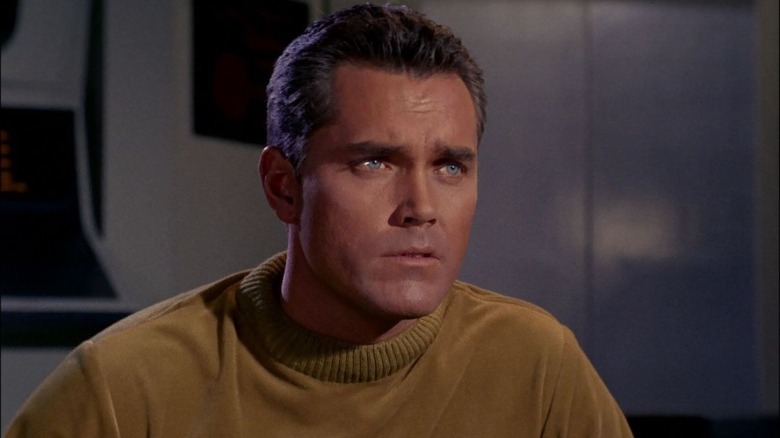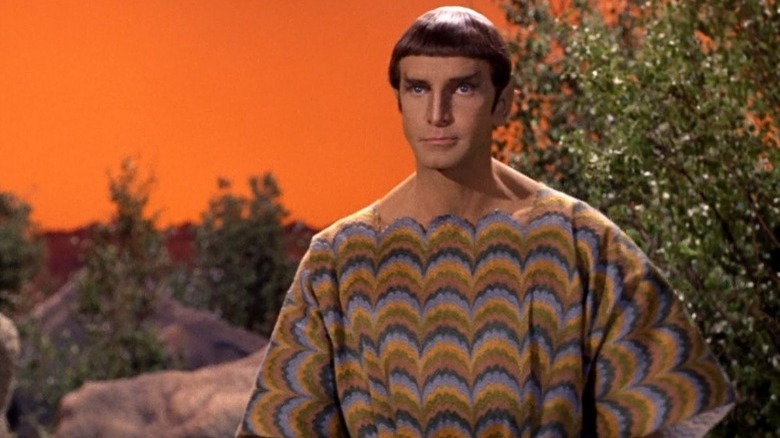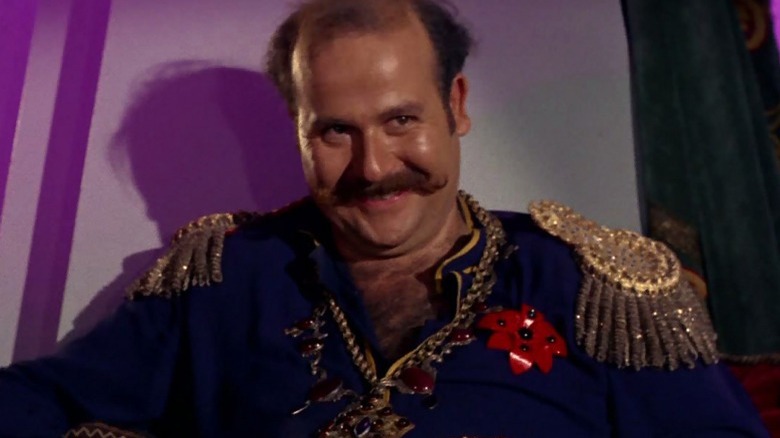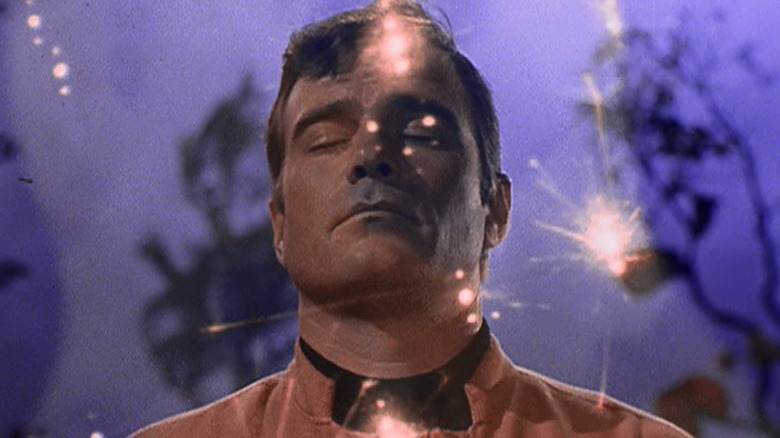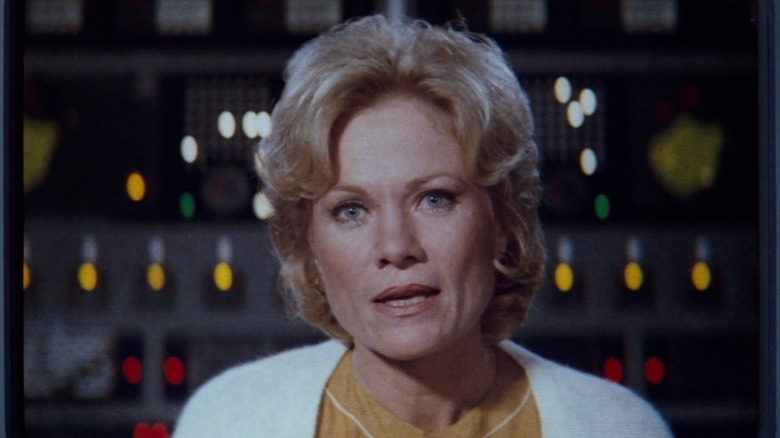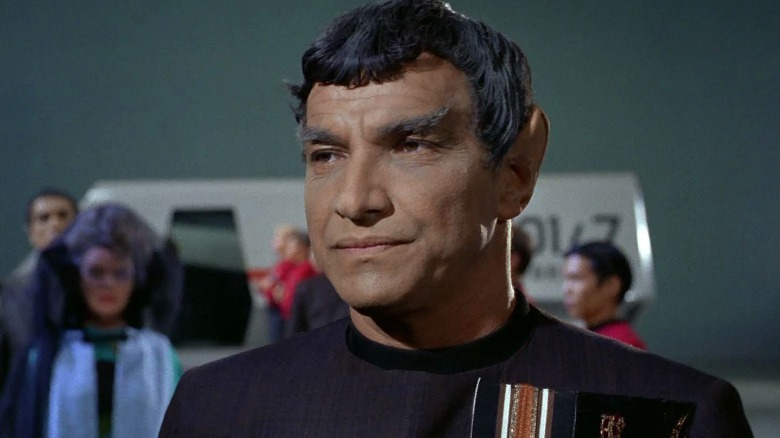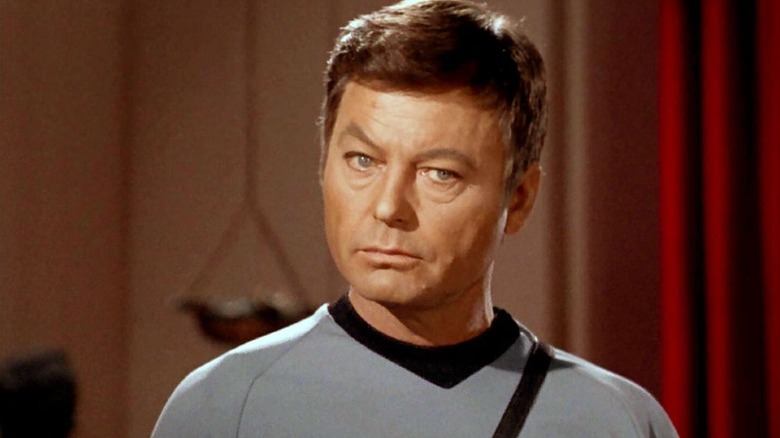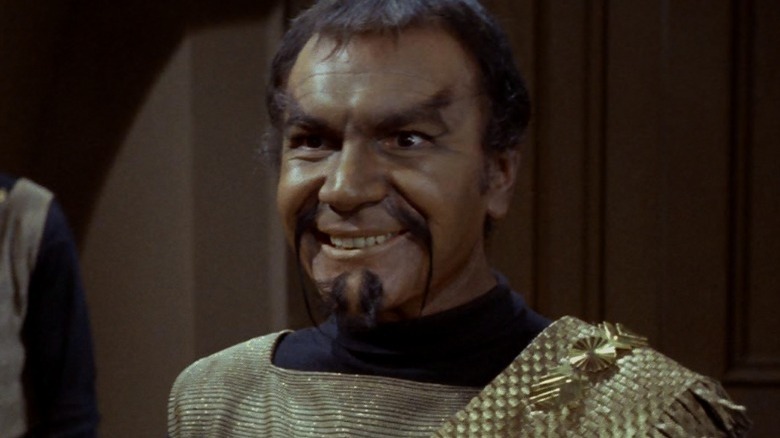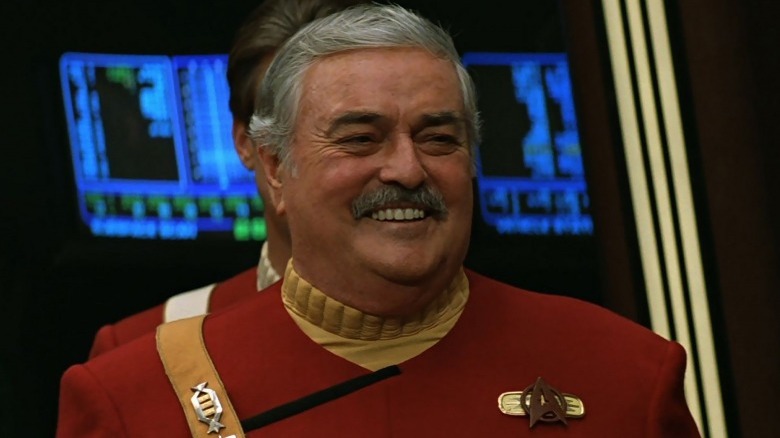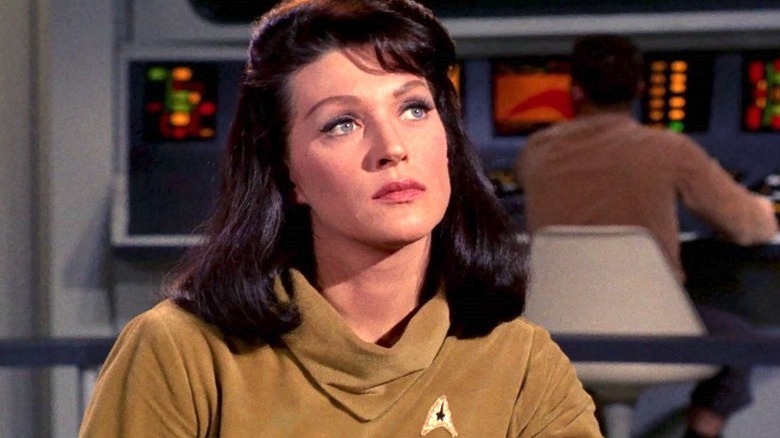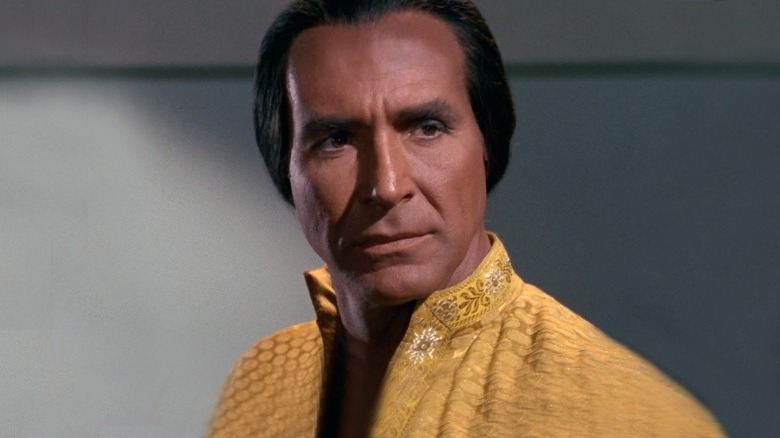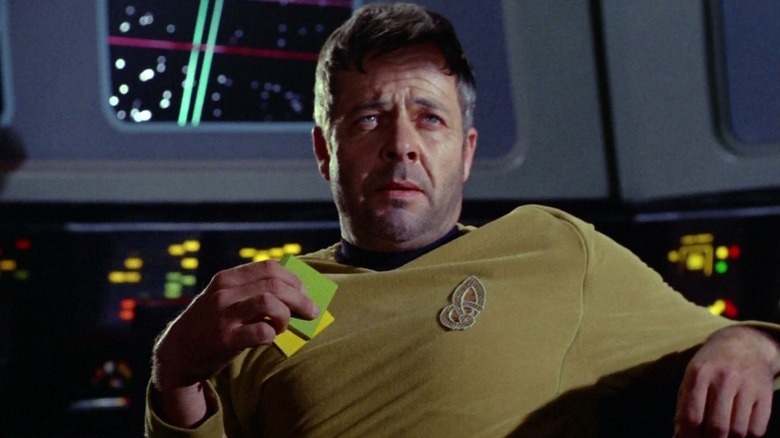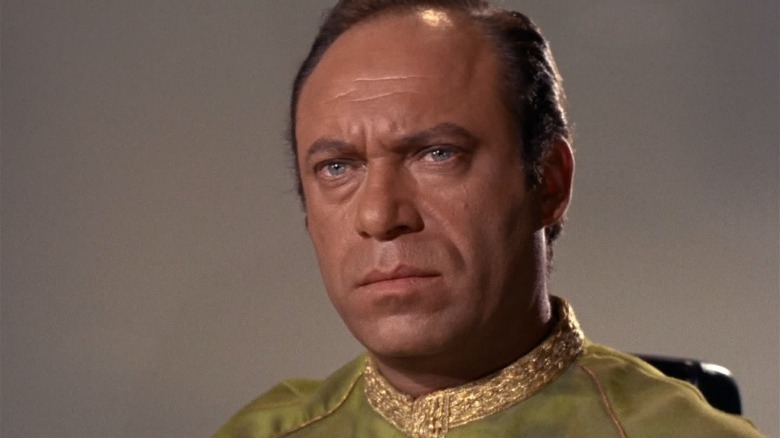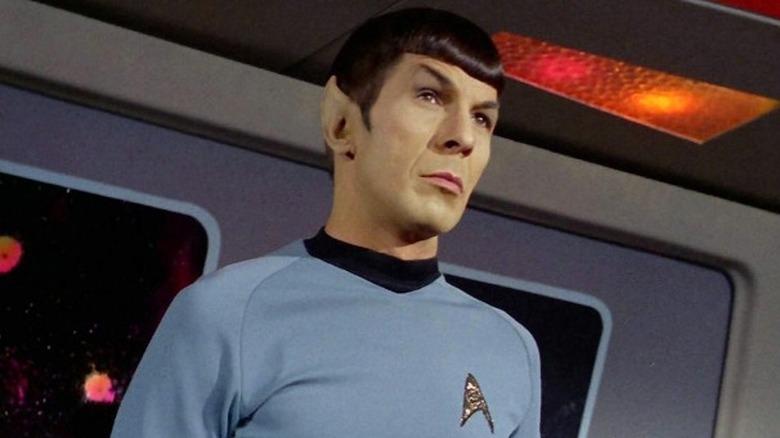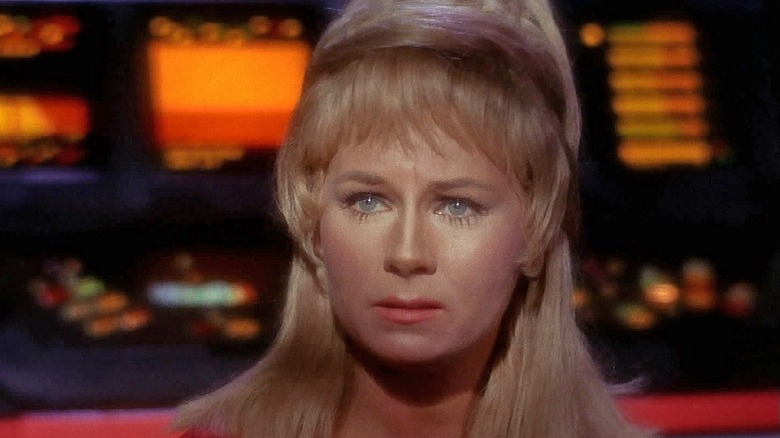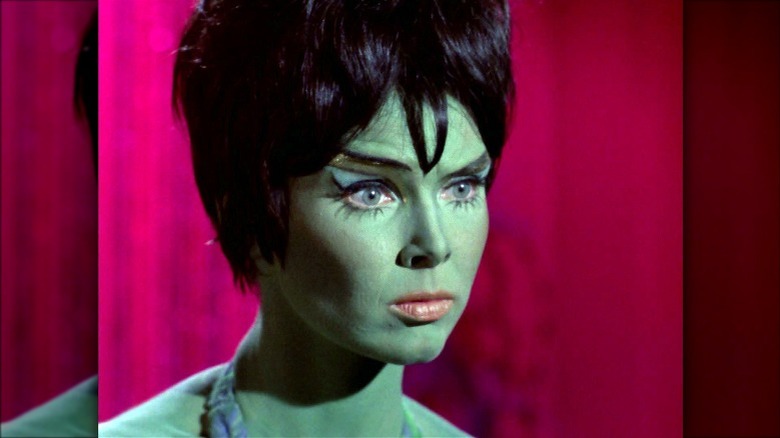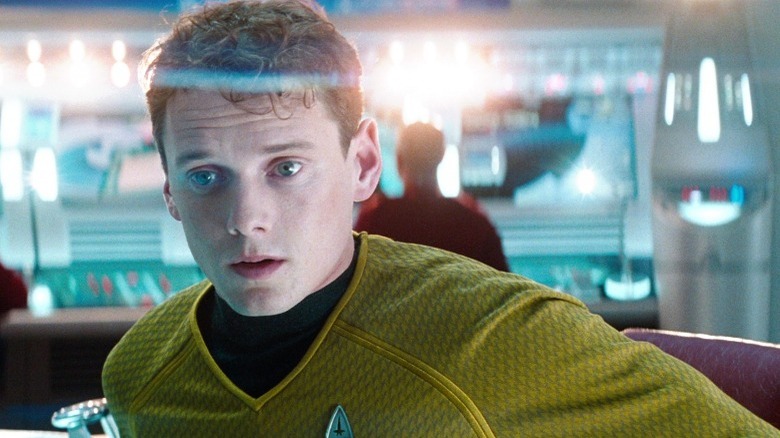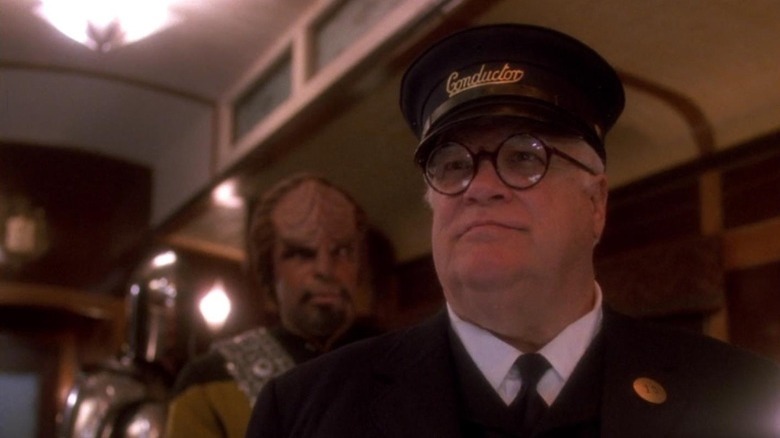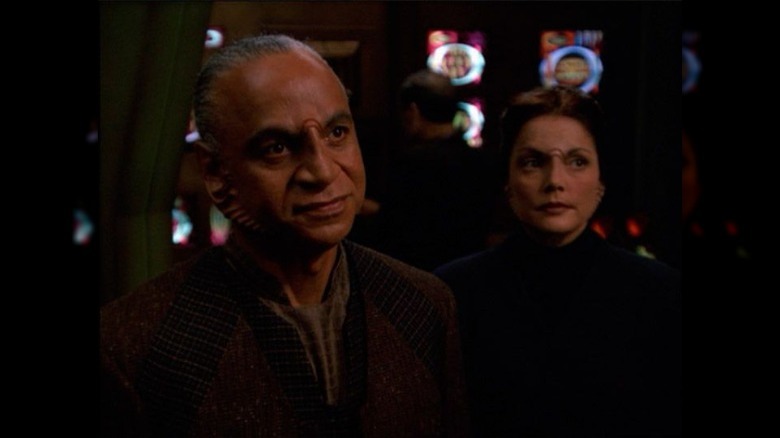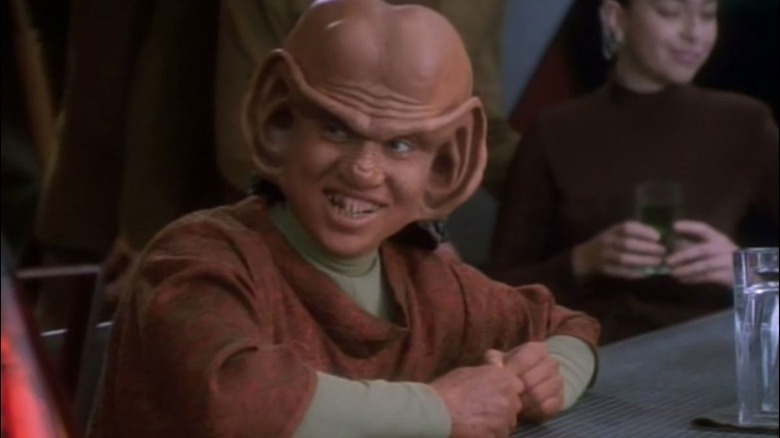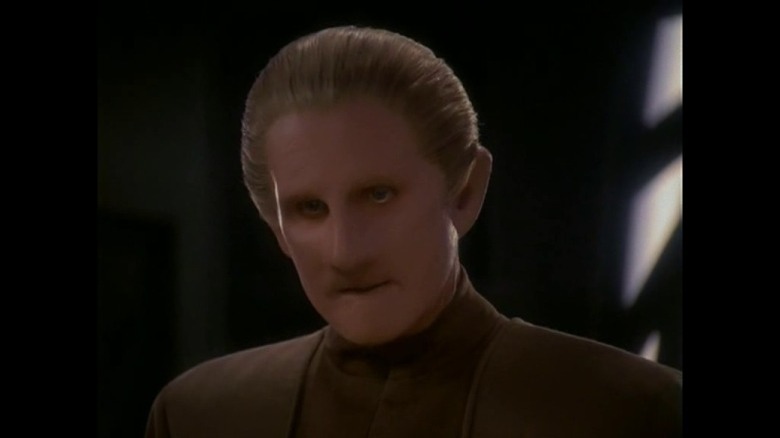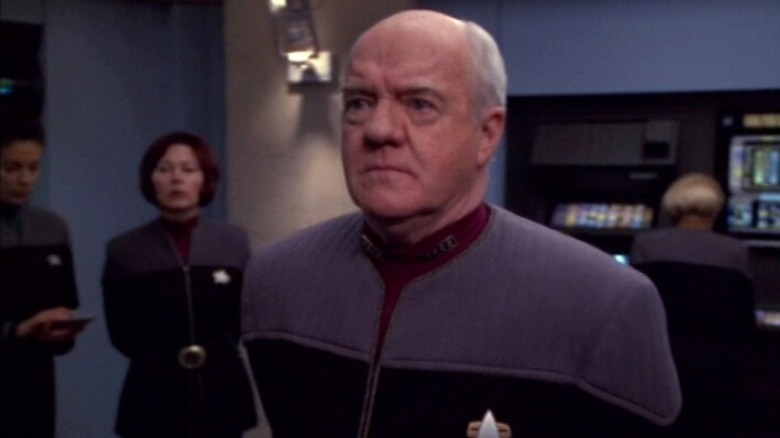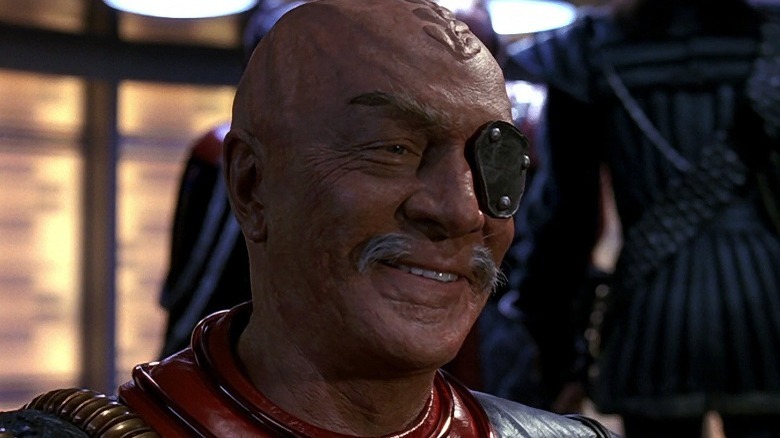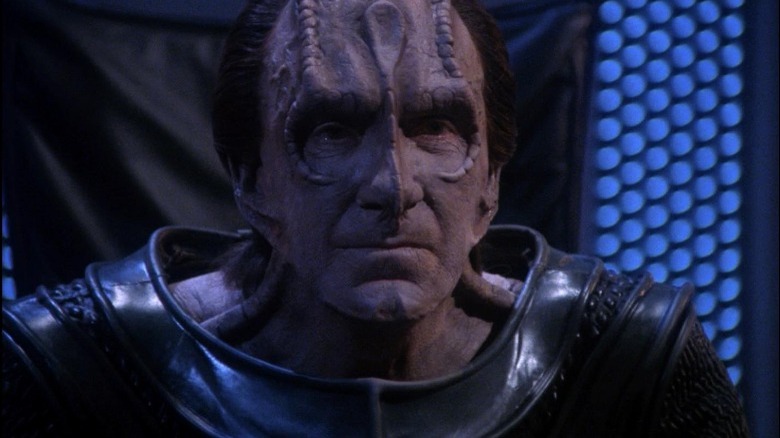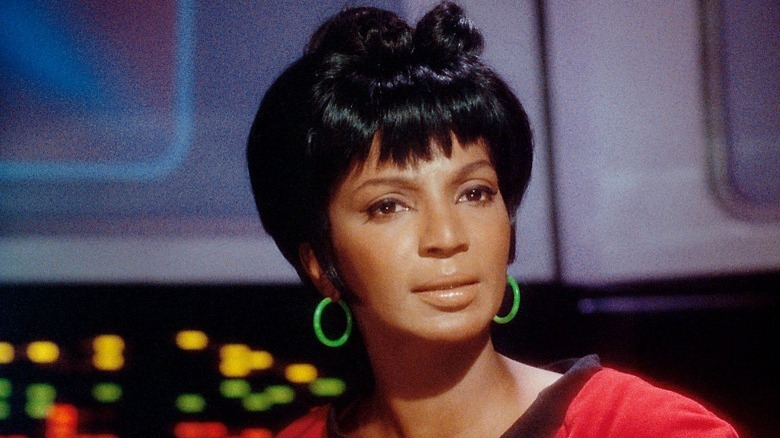Stars From Star Trek You Didn't Know Died
"Star Trek" has been a cultural phenomenon since the moment it was first put on the air. The original series garnered huge numbers of fans, most of whom were incredibly disappointed when NBC canceled the show in 1969. Despite all the fans who loved it, "Star Trek" wasn't cutting it in the ratings. Still, people loved the cast and crew of the USS Enterprise so much that they held conventions, lobbied the network, and effectively reignited "Star Trek" fandom, bringing it back from broadcast oblivion.
The main reason people loved the series enough to push for the creation of what ultimately became a massive franchise was the people. The cast included a plethora of incredibly talented actors of stage and screen, from the Captain's chair all the way down to a random Redshirt killed on an away mission. The people who cast "Star Trek" clearly knew what they were doing, and their expertise continued in every movie, live-action, and animated series that followed.
Because "Star Trek" has been around since 1966, many of the talented people who brought their characters to life have been "beamed up," so to speak. Countless actors have died since they appeared in a film or "Star Trek" series over the years, making a list of all of them rather cumbersome. Instead, this list features some players who took on key roles over the years, many of whom you may not realize have died.
Jeffrey Hunter
While it's well known that Captain James T. Kirk commanded the USS Enterprise in the original "Star Trek" series, some fans may not know he wasn't the first to captain the ship. Captain Christopher Pike, played by Jeffrey Hunter, was the second person to command the famed vessel, making Kirk the third. "Star Trek's" original pilot episode, "The Cage," featured Pike as the Captain. Ultimately, several aspects of the pilot were scrapped, including Pike, though the character made an appearance via archival footage and a different actor in "The Menagerie."
Christopher Pike eventually snagged the lead in "Strange New Worlds," so Hunter's character lives on in the "Star Trek" franchise. While Hunter occasionally worked in television, with "Star Trek" being only a blip in his long career, he was predominantly a feature film actor. His career began in 1950 via an uncredited role in "Julius Caesar," and it only took him two years to land a leading role in 1952's "Lure of the Wilderness." He continued acting in films with occasional forays into the small screen. He's probably best known for playing the titular character in "Temple Houston," which ran from 1963 to '64.
Hunter's health took a turn for the worse when an explosion on the set of "Cry Chicago" injured his spine and caused a concussion. Six months later, he had an intracranial hemorrhage, causing him to collapse and fracture his skull, requiring brain surgery. He died shortly after at the age of 42 — only three months after marrying Emily McLaughlin.
Barry Atwater
Vulcans have long been a significant race in the "Star Trek" franchise, thanks to Leonard Nimoy's brilliant portrayal of Mr. Spock. There weren't many Vulcans in the original series, making the few who did show up incredibly important. That's certainly true of Surak, the father of Vulcan's philosophical embrace of logic over emotions. He's arguably the most important Vulcan in the species' history. Surak appeared in a single episode titled "The Savage Curtain" and was played by Barry Atwater. Other actors in various series have since portrayed the character.
Atwater's career began in 1954 when he appeared in an episode of "Gunsmoke." He continued to appear in numerous television series and some films before appearing on "Star Trek." He's probably best known for his work in "General Hospital," "The Hard Man," "The Story of Lynn Stuart," "The Night Stalker," and "The True Story of Jesse James." His work earned him significant praise and helped him gain top billing in episodes of "The Outer Limits" and many other series. He was also a talented stage actor, having appeared in theatrical productions throughout his career.
Atwater's work began to slow down in the 1970s due to a diagnosis and treatment of cancer. His cancer became terminal, and he died of a stroke in May 1978. Atwater celebrated his 60th birthday nine days before his death. Allegations of steroid use plagued his life for years, and some believed it to be a contributing factor in his death.
Roger C. Carmel
"Star Trek" featured numerous one-off characters, many of whom made an impact. Occasionally, someone would return to reprise their role, as Roger C. Carmel did for Harcourt Fenton "Harry" Mudd. The character possessed a certain alluring charm that made him both likable and irredeemable at the same time. Mudd was a con artist and known smuggler. The character appeared in two episodes of "Star Trek" during the original series run. He first appeared in "Mudd's Women" and later returned for "I, Mudd."
Mudd made an impact and was later featured in "Star Trek: The Animated Series" in "Mudd's Passion." Carmel played the character three times, giving him a great deal of charisma, which was toned down by the actors who played Mudd in the modern "Trek" era. He was set to reprise Mudd in "Star Trek: The Next Generation" but died before filming began. Carmel is well known among the franchise's fanbase, but it's hardly the only credit on his resume. Carmel began acting on Broadway in 1958 and appeared in numerous theatrical productions through the years.
His time on Broadway honed his skills, which he employed on numerous films and television series, including "The Transformers," where he provided several characters' voices. Much of his later work came from behind the microphone, providing the voice of Smokey the Bear and other notable characters. Carmel died at the age of 54 in November 1986; his death was said to be from an overdose of narcotics but was officially listed as hypertrophic cardiomyopathy.
If you or anyone you know is struggling with addiction issues, help is available. Visit the Substance Abuse and Mental Health Services Administration website or contact SAMHSA's National Helpline at 1-800-662-HELP (4357).
Glenn Corbett
"Star Trek" has a complex lore that extends far into the past and future, thanks to some time travel shenanigans. Because of this, several characters are considered significant to the overarching themes. Sarak is one such character for the Vulcans, while for the humans of Earth, you can't find a more prominent figure than Zefram Cochrane, the father of warp travel. Cochrane's work brought humanity to the Vulcans' attention, opening the door for interstellar travel and making him a key historical figure.
Cochrane first appeared in the second season of "Star Trek" via the episode "Metamorphosis." He's found on an asteroid by Kirk and was artificially de-aged and living 150 years after his disappearance. The character would later be played by James Cromwell in "Star Trek: First Contact," but Glenn Corbett first brought him to the small screen. Corbett's acting career came after his stint in the U.S. Navy, where he served as a Seabee. He went on to act in theatrical productions, film, and television.
Corbett's career includes notable appearances in "Gunsmoke," "The Man from U.N.C.L.E.," and "The Fall Guy." His film credits put him on the same projects as John Wayne ("Chisum") and Jimmy Stewart ("Shenandoah"), among many other Hollywood stars. Corbett continued acting until his death in 1993 following six months of treatment for lung cancer. He died at age 59 and was buried at the Fort Sam Houston National Cemetery in San Antonio, Texas.
Bibi Besch
Captain Kirk had something of a reputation for always finding his way into an alien lady's arms. From the beginning, he was too charming to resist, leading to numerous liaisons with various women. Most of his dalliances didn't last long, but there was one woman who captured his attention far longer than any other. Dr. Carol Marcus and Kirk had a relationship sometime in the late 2250s or early '60s, which produced a son, David. Marcus felt Kirk's responsibilities to Starfleet made a relationship impossible, so she asked that he stay away so that she could raise David without him.
Kirk agreed but ran into Dr. Marcus and David during the events of "Star Trek II: The Wrath of Khan" and "Star Trek III: The Search for Spock," in which David died. David's death affected Kirk for the remainder of his days and made him intensely distrustful of the Klingons. While Dr. Marcus didn't appear in the original series, she made a significant impact in "The Wrath of Khan," where she was played by Bibi Besch. The actor made a name for herself on several soap operas in the late 1960s before making her way to the silver screen.
She starred in several notable films, including "Steel Magnolias" and "Tremors." Besch continued working well into the 1990s, but a breast cancer diagnosis cut her career and life short. She died in September 1996, at the age of 54, from the disease.
Mark Lenard
Mr. Spock is probably the most famous Vulcan to appear in any "Star Trek" series, and most fans know he's half human and half Vulcan. His mother, Amanda Grayson, met his father, Sarek, via his work as the Vulcan ambassador and representative of the Federation Council. Sarek, like his son and adopted daughter, Michael Burnham, was an intensely analytical and intelligent person. He became a prominent figure in Vulcan and Federation circles, connecting him with several notable people, including James T. Kirk and Jean-Luc Picard.
Sarek featured heavily in several "Star Trek" properties, including the first, third, fourth, fifth, and sixth theatrical films. Through it all, he was portrayed by Mark Lenard, who remained with the franchise for a considerable time. In addition to his appearances on "Star Trek," which included playing an unnamed Romulan commander, he played Sarek on "Star Trek: The Animated Series" and several episodes of "Star Trek: The Next Generation." In addition to working on the franchise, Lenard had roles in numerous high-profile films, including "Hang' Em High" and "Annie Hall."
Despite his film roles, Lenard is best known for his time on the small screen. Throughout his 42-year-long career, Lenard played parts on "Hawaii Five-O," "Gunsmoke," "The Incredible Hulk," and much more. Still, he's probably best known for playing Sarek, if his obituaries are any indication. Lenard died at the age of 72 from multiple myeloma, a type of white blood cell cancer that is treatable but incurable.
DeForest Kelley
The original "Star Trek" series and its feature films consisted of a plethora of characters, but three stood out among the rest. They were Captain Kirk, Mr. Spock, and Dr. Leonard "Bones" McCoy. The three senior officers worked closely together throughout their many adventures, becoming incredibly close friends along the way. McCoy was instrumental in reviving Spock's mind when he died and was reborn in "Star Trek III: The Search for Spock." Since the beginning of the series, Bones was played brilliantly by DeForest Kelley.
Kelley's time on "Star Trek" came at the end of a long acting career that began in 1940. He served in the U.S. Army Air Forces during World War II and decided to pursue acting as a career when he got out in 1946. While he had limited work before the war, it wasn't until 1947 that his professional career took off with the film "Fear in the Night." He continued appearing in movies and television series, specializing in Westerns for a good chunk of his career. Everything changed when he was cast as Bones in "Star Trek," as the role would dominate his career from that point forward.
Most of his acting work continued through the franchise by appearing in the first six films. He also had a cameo in the pilot episode of "Star Trek: The Next Generation," making him the first character from "Star Trek" to do so. Kelley died from stomach cancer in 1999, at the age of 79.
John Colicos
Ask any non "Trek" fan to name a species from the franchise; odds are, you'll hear "Klingon" more than anything else. The Klingons have been a significant part of "Trek" lore, which goes back to the original series. The first episode to feature the aggressive species was "Errand of Mercy, but you may not recognize the makeup as being Klingon these days. There's an in-universe explanation for this, but needless to say, whatever they look like, the Klingons are a big part of the franchise. An early standout was Kor, an unusually charismatic Klingon.
John Colicos played Kor in the original series, and he continued playing the character for decades. While he didn't return for "Star Trek: The Next Generation," Kor — and Colicos — returned for three episodes of "Star Trek: Deep Space Nine." The same actor slapped on some era-appropriate makeup and became Kor once more. He was finally killed in "Once More Unto the Breach," a full 31 years after his first appearance. Colicos' work on the franchise kept him in fans' minds for years, though he did diversify into feature films and theater throughout his 49-year career.
He spent decades working on various television series as a character and voice actor. He voiced Apocalypse in "X-Men: The Animated Series," and outside of "Trek," he's probably best remembered for playing Count Baltar on "Battlestar Galactica." Colicos died in 2000 following a heart attack at the age of 71.
James Doohan
Montgomery Scott, better known as Scotty to his friends, was one of the main characters on "Star Trek," though he was initially meant to be a semi-regular. That didn't last long, and Scotty soon became a vital member of the crew, appearing in numerous episodes of the original series and "The Animated Series." He returned for "Star Trek: The Motion Picture" and continued appearing in the movies, with "Star Trek: Generations" being his final film appearance. Still, Scotty wasn't finished with the Enterprise.
The character made one final canonical appearance in an episode of "Star Trek: The Next Generation," aptly titled "Relics," though it was filmed two years before "Generations." Scotty was created mainly by the man who played him, James Doohan. He once told Sci-Fi Online, "Scotty is ninety-nine percent James Doohan and one percent accent." Gene Roddenberry let him come up with the name, which he did in honor of his grandfather. He also played a significant role in making Scotty Scottish.
Doohan's talent for accents earned him plenty of work over the years, and he brought to life a lot of animated characters on "The Animated Series" and other projects. His career was somewhat taken over by "Star Trek," but he didn't do much to break away, instead choosing to embrace the fandom and accept his role in bringing "Star Trek" to the world. Doohan died at the age of 85 at his home from Alzheimer's disease and pneumonia in 2005.
Majel Barrett
Thousands of people have worked on various "Star Trek" projects over the years, but only one of them can be called the "First Lady of 'Star Trek.'" Majel Barrett's career began in comedy and was instructed by Lucille Ball. She appeared on several prominent series, including "The Lucy Show," "Leave it to Beaver," and more, but she's best known for her association with "Star Trek." Barrett eventually married series creator Gene Roddenberry, and she appeared in every incarnation of the franchise made during her lifetime. In this capacity, she played over a dozen characters, all of which are notable.
In the pilot episode, she played the Enterprise's first officer, called "Number One" by Captain Pike. The character didn't work out well for various reasons, so Majel Barrett played Nurse Christine Chapel (in a blonde wig) when NBC picked up the series. Nurse Chapel appeared on the show several times and played a prominent role in a few episodes. When "Star Trek" was revived via "The Next Generation," Barrett was brought back via the newly created Lwaxana Troi. Her character was incredibly unorthodox and captivating, and she returned for several episodes of "Deep Space Nine."
Perhaps Barrett's most significant contribution to the franchise was her voice. From the beginning, she provided the voice of the Enterprise (and other Starfleet) computers. Before she died at 76 from leukemia in December 2008, she recorded a library of phonetic sounds and dialogue so that her voice could continue functioning on Starfleet vessels long after her passing.
Ricardo Montalbán
None of the great villains to appear throughout the "Star Trek" franchise is as beloved and reviled as Khan Noonien Singh. Khan first appeared in the "Star Trek" episode, "Space Seed," in 1967, and he made quite a splash. Khan once conquered and ruled 25% of Earth, making him one of the most prominent villains of the Eugenics Wars. As a genetically augmented human, Khan possessed physical and mental abilities far outclassing other humans. This made him especially dangerous, so once defeated, he was cryogenically frozen and shot into space.
That's where Kirk and his crew found and revived him. Khan nearly took control of the Enterprise before Kirk managed to maroon him on Ceti Alpha V. Fast-forward to "Star Trek II: The Wrath of Khan," and Khan was back as the primary antagonist in what is arguably the best "Star Trek" film to date. The main reason Khan was such a compelling villain wasn't how he was written; it was how the inimitable Ricardo Montalbán played him. Despite making a significant impact in "Trek" history, Montalbán was hardly a one-trick pony.
The man was already a veteran actor of stage and screen long before coming to the franchise. He played Armando in "Escape From the Planet of the Apes," Mr. Roarke in "Fantasy Island," and appeared in numerous television series and films. He won numerous awards, including an Emmy and Screen Actors Guild Lifetime Achievement Award. Montalbán died of natural causes in January 2009, at the age of 88.
William Windom
While the captains of Starfleet's vessels are essential in the overall scheme of things, they aren't the highest echelons of command. Starfleet is structured much like the U.S. Navy, with a hierarchical command structure overseeing its operations in the Alpha and Beta quadrants of the galaxy. That said, just because someone is of considerably high rank doesn't mean they aren't susceptible to the same problems as everyone else, which brings us to Commodore Matt Decker. He commanded the USS Constellation in the "Star Trek" episode, "The Doomsday Machine."
After losing his entire crew to an alien planet killer, the Commodore fell into a fit of depression. With his ship crippled and nobody else around, he became overwhelmed with grief. That's a complex emotion to play, and William Windom managed it splendidly. The actor is well known for his role as Commodore Decker, though it's not his only credit. Windom began acting in 1950, and he found his way onto numerous popular programs, including "Columbo," "Gunsmoke," and "Magnum, P.I.," among others.
Windom was also a celebrated feature film actor, appearing in "To Kill a Mockingbird, "Planes, Trains, & Automobiles," and many more. He was considered "TV's Everyman" for his plethora of performances on the small screen, where he worked until 2004. His final franchise credit is a reprisal of Matt Decker in "Star Trek: New Voyages," a fan film. According to The Washington Post, Windom died in 2012 at the age of 88 from congestive heart failure.
Malachi Throne
One thing that seems to happen often in the "Star Trek" franchise is that actors take on multiple roles. This is possible thanks to the detailed makeup and prosthetics actors wear to portray the many alien species seen in the shows and films. Majel Barrett is a good example, as is Jeffrey Combs — between the two of them, they played over a dozen distinct characters. The practice goes back to the very beginning with the pilot episode, "The Cage." Malachi Throne was cast as the Keeper's voice in the episode, and the recording was later used for the production of "The Menagerie."
In that same episode, Throne played Commodore José I. Méndez, so his voiceover work was modified in pitch. He remained with the franchise as it evolved, and by the time "Star Trek: The Next Generation" was on the air, he was a Romulan Senator. He played a lot of interesting characters throughout his seven decades of working in the industry. Outside of "Star Trek," he's probably best known for his work as Noah Bain on "It Takes a Thief" or his portrayal of False-Face on the "Batman" television series.
Throne's career kept him busy throughout the 1960s and '70s, and while he continued to work into the 21st century, he took on more voiceover roles than live-action performances. He provided the voice for God on "The Animaniacs," Fingers on "Batman: Beyond," and much more. Throne died in his home in March 2013 from lung cancer at the age of 84.
Leonard Nimoy
Captain James T. Kirk is arguably the central protagonist of "Star Trek," but he didn't venture through space alone. Among his crew, Mr. Spock is undoubtedly the closest friend Kirk has, and he's also a vital member of the crew. With his brilliant mind, Spock can calculate the necessary trajectory to fly back in time by slingshotting around the sun, and that's just one example of many concerning the Vulcan's brilliance. Mr. Spock was largely created by Leonard Nimoy, who incorporated aspects of his Jewish faith and came up with the Vulcan nerve pinch, as he thought it was a better and more sophisticated option than using a weapon.
Nimoy's portrayal of Spock wasn't simply a good addition to the series; it made a significant cultural impact on the zeitgeist. Spock became internationally known by people who had never watched an episode or film from the franchise. Nimoy played Spock throughout his life, beginning with the pilot episode completed in 1965 and ending with his final performances in the rebooted film franchise via "Star Trek" in 2009 and "Star Trek Into Darkness" in 2013.
Spock wasn't all Nimoy did during his life; he wrote an autobiography called "I am Spock." Granted, his earlier work was titled "I Am Not Spock," so he eventually embraced his cultural impact and the character he brought to life. He had a music career, directed films, acted, and much more. Nimoy died from chronic obstructive pulmonary disease (COPD) after becoming comatose in February 2015, at the age of 83.
Grace Lee Whitney
Janice Rand was the yeoman aboard the Enterprise from the beginning of the series, though she didn't appear in the pilot episodes. She was introduced as one of Captain Kirk's many love interests, but the characters wouldn't pull the trigger on the relationship. About midway through the first season, the character was removed from the series despite playing significant roles in "The Enemy Within" and other pivotal episodes. Rand had to go to cut costs, but the actress who played her, Grace Lee Whitney, remained in Gene Roddenberry's mind.
Thanks to DeForest Kelley, who encouraged her to make appearances at "Star Trek" conventions, Whitney regained popularity. She was brought back in "Star Trek: The Motion Picture." Later, she appeared in the fourth and sixth films, playing Rand. Whitney reprised her role for the fan series "Star Trek: Of Gods and Men" and "Star Trek: New Voyages." While "Star Trek" took up much of Whitney's time throughout the 1960s and '80s, it wasn't her only credit. She also sang in orchestras and choirs, and appeared in various television series.
Whitney was a multitalented woman who lived an interesting life, which you can read about in her autobiography, "The Longest Trek: My Tour of the Galaxy." Whitney's final credited role was her reprisal of Yeoman Rand in "Star Trek: Of Gods and Men" in 2007, as she retired from acting soon after. The veteran "Star Trek" actress died of natural causes at the age of 85 in May 2015.
Yvonne Craig
There are few characters from the original series as iconic as Marta, the Orion slave girl from the episode "Whom Gods Destroy." Marta wasn't merely beautiful; she was delusional and had to be held at the Federation asylum on Elba II. She often quoted famous works of literature, including passages from William Shakespeare's many plays. Marta met Captain Kirk and Spock when her master, Garth of Izar, captured them, placing the trio in a room together. Seeing Kirk, Marta attempts to seduce him, but when that doesn't work, she tries to stab him (spoiler: that didn't work either).
Eventually, Garth used Marta as an example, killing her on the planet's toxic surface. Marta became an iconic character in the franchise despite appearing in only one episode. The "Orion Slave Girl" trope remains popular today and was the subject of the third season of "Star Trek: Discovery." Marta was played by Yvonne Craig, who starred as Barbara Gordon/Batgirl in the "Batman" television series before switching from a superhero to an Orion woman on "Star Trek." She was called a "pioneer of female superheroes on the small screen" by HuffPost, and it's an apt description.
Craig continued acting, primarily on the small screen, after her work on "Star Trek." She appeared in numerous series, including "The Six Million Dollar Man," "Starsky & Hutch," and "Fantasy Island." She died in August 2015 from breast cancer that spread to her liver. She was 78 when she died.
Anton Yelchin
When "Star Trek" was rebooted via the 2009 film, a new cast got the opportunity to play the roles created decades earlier by the likes of William Shatner, Leonard Nimoy, and all the rest. One of the characters who appeared in the film was Pavel Chekov, the young Russian Starfleet ensign who sat at the helm, working as the Enterprise's navigator. In a memo, Gene Roddenberry described Chekov as an important secondary character who was planned to be "an extraordinarily capable young man — almost Spock's equal in some areas" (via Mission Log).
Of course, most people recall him from Walter Koenig's performance in "Star Trek IV: The Voyage Home" when he asks a police officer about the location of "nuclear wessels" without realizing he's smack-dab in the middle of the Cold War. Koenig played the character brilliantly, and he was followed by another young actor, Anton Yelchin, who played him in the first three films from the rebooted Kelvin timeline. Sadly, Yelchin's time as Chekov ended following a freak accident that shocked the fandom and ended a promising career.
In June 2016, Yelchin was crushed to death by his Jeep Grand Cherokee, which rolled down his driveway, pinning him against a security gate. His parents sued the auto manufacturer, and according to a statement given to People, they settled for an undisclosed amount. The money was given to the Anton Yelchin Foundation as well as the funding of "Love, Antosha," a documentary on the actor's life.
David Huddleston
"Star Trek: The Next Generation" was an incredibly popular series, so several episodes featured guest stars who usually appeared only once on the show. This was often the case in episodes dealing with the holodeck, which often glitched out, undid the safety settings, and threatened the ship, as any good recreational activity will do. Among the many characters to act in unusual ways on the holodeck, the ones from the episode "Emergence" are the most interesting, as they represent aspects of the USS Enterprise's burgeoning sentient consciousness.
In the episode, a train and various passengers head to New Vertiform City, and the conductor doesn't only direct the train; he also changes the course of the Enterprise. This creates several problems for the crew, and they intervene. Ultimately, a new, complex lifeform is borne from the Enterprise, suggesting the ship itself was an intelligent being. While that never came back as a plot element following the episode, the crew nonetheless remembered the conductor, who was played by famed character actor, David Huddleston.
Huddleston's career includes significant roles in dozens of television series and movies. Modern audiences likely recognize him as the eponymous character in "The Big Lebowski," while others may recognize him from "Blazing Saddles," "Santa Clause: The Movie," "The Producers," or any of his many, many roles. USA Today reported that Huddleston died in August 2016 from advanced heart and kidney disease, and he was 85 years old at the time of his death.
Ron Glass
"Star Trek: Voyager" was another series that included numerous guest stars throughout its episodes. Some notable guest actors include Sarah Silverman, Kurtwood Smith, and Gerrit Graham. One interesting guest role, Loken, came in the seventh season episode "Nightengale." The character was a scientist who developed a new form of cloaking technology so the Kraylors could bypass a blockade encircling their planet. The episode was significant, primarily for ensign Harry Kim, who was in command of the USS Voyager at the time. Loken deceived him into thinking he was a doctor delivering much-needed vaccines, but that wasn't remotely true, leaving Kim disturbed by the incident.
Loken was played by Ron Glass, a noted character actor best known for his work as Detective Ron Harris on "Barney Miller." Granted, that was in the 1970s and '80s, so these days, he's likely best known for playing Shepherd Book on "Firefly" and in its 2002 film, "Serenity." Glass' career began in the early 1970s when he landed a role in "Sanford and Son." This was followed by "All in the Family," and he appeared in other popular series during that time before eventually landing the role of Detective Harris.
While he appeared in several films throughout his career, most of his work was on the small screen. Glass stopped working around 2014, and two years later, he died from respiratory failure. Glass was 71 when he died in November 2016.
Aron Eisenberg
When the Ferengi were introduced in "Star Trek: The Next Generation," the plan was to make them a new villainous race for the franchise. That didn't pan out, and by the time "Star Trek: Deep Space Nine" aired, the species had been fleshed out into a far more reasonable and entertaining group of commerce-driven con artists. The Ferengi were a central species in the series, with several prominent characters. One such character was Nog, a young Ferengi who joined Starfleet, becoming the first of his species to do so.
Nog embraced his culture while serving in Starfleet, proving a Ferengi could not only serve but do so with distinction. He lost a leg in combat during the Dominion War and served a vital role aboard the USS Defiant through several important battles during the conflict. Aron Eisenberg played Nog, and it was a role that dominated his career. While he appeared in over a dozen TV series and films, he's best known for playing Nog, and during his life, Eisenberg was a regular at "Star Trek" conventions.
Eisenberg was born with only one kidney, requiring and receiving a transplant when he was 17. Decades later, he was again diagnosed with kidney failure, requiring a transplant. While he did receive a successful transplant, his health remained a problem. Variety reported that Eisenberg died at the age of 50 in September 2019. He was honored in a "Star Trek: Discovery" episode featuring an Eisenberg-class starship named the USS Nog.
René Auberjonois
"Star Trek: Deep Space Nine" featured several notable Ferengis, but the series' most fascinating addition has to be Odo. The space station's security officer was an amorphous, unidentified species capable of taking on a humanoid form, and he was a prominent member of the crew from day one. Over time, Odo's backstory is fleshed out, as he was revealed to be a member of the species known as the Founders. They became the primary antagonists in the latter seasons, as they waged war against the Federation and other species during the Dominion conflict.
Odo became a central figure in the series, and because of his ability to transform into anything, he could sneak aboard ships, infiltrate heavily defended areas, and integrate himself into all manner of situations. Odo was played by René Auberjonois, a celebrated Tony Award-winning theater actor with many impressive credits to his name. He featured in numerous films, playing Father Mulcahy in "M*A*S*H," and he earned an Emmy Award nomination for his work on "Benson" in the late-1970s and early '80s.
Auberjonois was also a talented voice actor, working mainly in video games later in his career. He also provided his vocal talents to animated works, notably playing Chef Louis in "The Little Mermaid." Auberjonois was treated for lung cancer with chemotherapy, but it spread to his brain in 2019. In December 2019, at the age of 79, he chose to end his life under California law rather than slowly perish from his condition.
If you or anyone you know is having suicidal thoughts, please call the National Suicide Prevention Lifeline by dialing 988 or by calling 1-800-273-TALK (8255).
Richard Herd
Admiral Owen Paris was the father of Tom Paris, the helmsman who piloted the USS Voyager throughout most of the series. While he didn't have many scenes in the series and appeared in only a handful of episodes, he was a pivotal figure in reestablishing communications with the lost vessel. Voyager was believed lost for some time before the Pathfinder project established communications via Reginald Barclay's breakthrough research into micro-wormholes.
Admiral Paris' determination to bring the Voyager and its crew home remained a continuous plot throughout the series. The man hired to play the character was Richard Herd, who is probably best known for his many supporting and guest roles in dozens of television series between 1973 and 2018. While he often had recurring roles, he primarily played supporting characters. Despite this, fans likely recognize him from his time playing Admiral William Noyce in "SeaQuest DSV "and "Seinfeld," where he played Mr. Wilhelm, George Costanza's boss at the New York Yankees.
Herd even played a Klingon called L'Kor in two episodes of "Star Trek: The Next Generation," though you'd be hard pressed to recognize him under all that makeup. Some of his most notable film credits include "Private Benjamin" and "Planes, Trains, & Automobiles," so he had a strong comedy background. Herd also spent considerable time behind the microphone, recording characters for a variety of video games. Herd continued working into his mid-80s and died of colon cancer in May 2020, at the age of 87.
Christopher Plummer
"Star Trek VI: The Undiscovered Country" is the final all-original cast "Star Trek" feature film, and it's a doozy. The movie centers around the assassination of Klingon dignitaries, leading to the imprisonment of Captain Kirk and Dr. Leonard McCoy. The pair were framed by a Klingon intent on keeping the Chancellor from signing a peace accord between the Klingon Empire and the Federation. That Klingon was General Chang, a charismatic lover of ancient Earth literature, played by the incredibly talented Christopher Plummer.
Plummer may be one of the most critically acclaimed of the many impressive actors to take on a role in the "Star Trek" franchise. The remarkable actor began his career in the theater in the late-1940s. Over the years, he racked up an impressive resume of performances, including playing Cyrano de Bergerac, Hamlet, King Lear, and many more. His film work includes playing Captain Georg von Trapp in "The Sound of Music," Dr. Rosen in "A Beautiful Mind," and John Adams Gates in "National Treasure," which is something most Canadians would call the veteran actor.
Plummer was an Academy Award-, Tony Award-, and Primetime Emmy Award-winning actor. These accolades earned him the coveted "Triple Crown of Acting" awards. His last notable film saw him play Harlan Thrombey in 2019's "Knives Out." Plummer lived a long life, ultimately dying at the age of 91 in February 2021. His death was likely the result of a head injury he sustained in a fall a couple of weeks earlier.
David Warner
David Warner is another outstanding actor to spend time in the "Star Trek" franchise, having played three iconic characters between 1989 and 1991. His first contribution to the franchise came via "Star Trek V: The Final Frontier," in which he played St. John Talbot. Two years later, he played Chancellor Gorkon, the leader of the Klingon Empire, in "Star Trek VI: The Undiscovered Country." Perhaps his most notable performance came not in a movie but in a two-part episode, "Chain of Command" in "Star Trek: The Next Generation."
The episode features Captain Picard's interrogation at the hands of Gul Madred, played by Warner. The Cardassian interrogator's expertise in terrorizing his captive as he attempts to break down his indomitable will is the stuff of "Star Trek" legend. It's arguably the best performance by a guest star from the entire series, and it's easily one of Warner's best characters on television. That's saying something, as the man dominated televisions for 60 years. He appeared in episodes of "Doctor Who," "Twin Peaks," and dozens of animated series via his fantastic voice.
Warner was also a notable stage and screen actor, having performed in numerous Shakespeare adaptations and award-winning movies. He played Keith Jennings in "The Omen" and had significant roles in "Tron" and "Titanic." The man was prolific and continued working for 18 months following a lung cancer diagnosis, which he kept from his fans. He died of the disease in July 2022 at the age of 80.
Nichelle Nichols
When "Star Trek" hit television for the first time in 1966, the character of Nyota Uhura was a groundbreaking addition. Having an African-American woman in the main cast was an unprecedented move for a primetime series. The scope of her inclusion's importance to the Civil Rights movement is evident when you learn that Dr. Martin Luther King Jr. changed Nichelle Nichols' mind when she was considering leaving the series. Additionally, Uhura's on-screen kiss with Captain Kirk was one of the most pivotal moments in television history, and that's just the tip of the iceberg regarding the character's importance (via TrekToday).
Nichols was aware of her impact on popular culture and the Civil Rights movement, and she continued to play the character for decades. Like many popular "Star Trek" actors, Nichols' career was dominated by that performance, though it wasn't the only work she did over the years. Nichols worked with NASA from 1977 until 2015 as a member of its recruiting program. She focused on recruiting minorities, women, and less-represented groups into the prestigious organization. Her work helped bring Guion Stewart Bluford Jr. and Dr. Sally Ride into the Astronaut program.
Nichols' health began to decline following a stroke in June 2015. Three years later, she was diagnosed with dementia, which resulted in her cancellation of appearances at fan conventions. She shrank from the public eye after this, and in July 2022, Variety reported that Nichols died at the age of 89 from heart failure.

